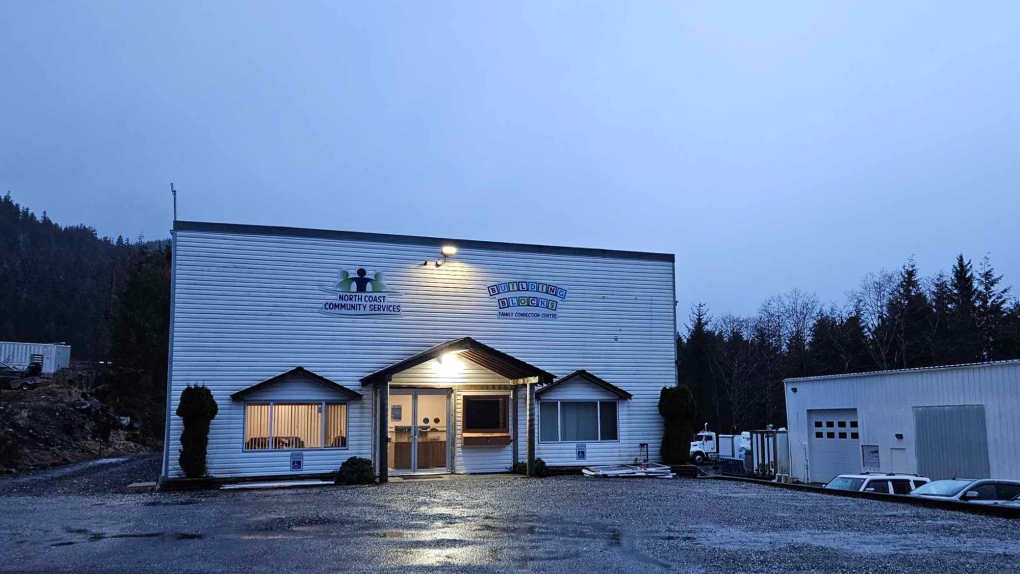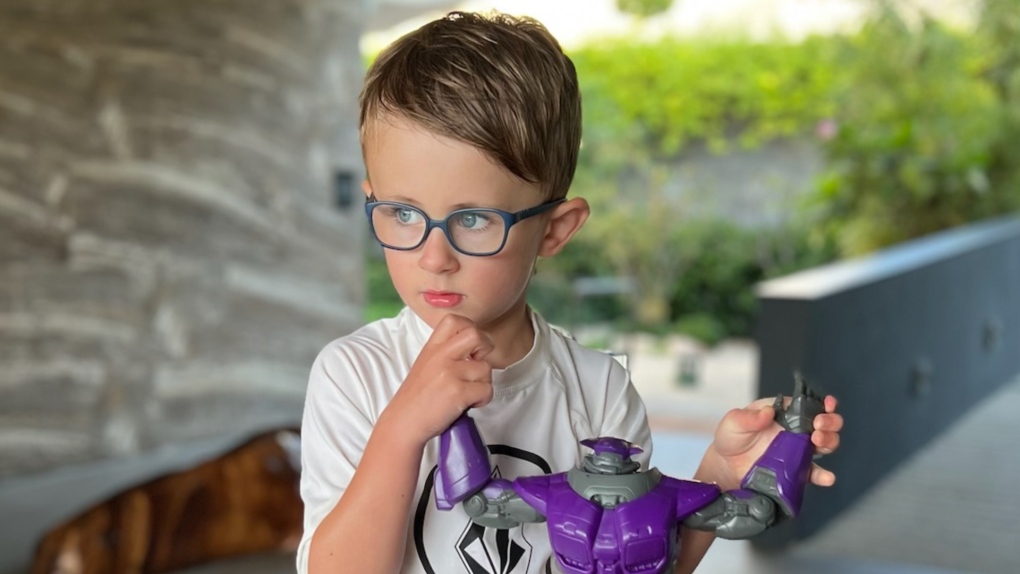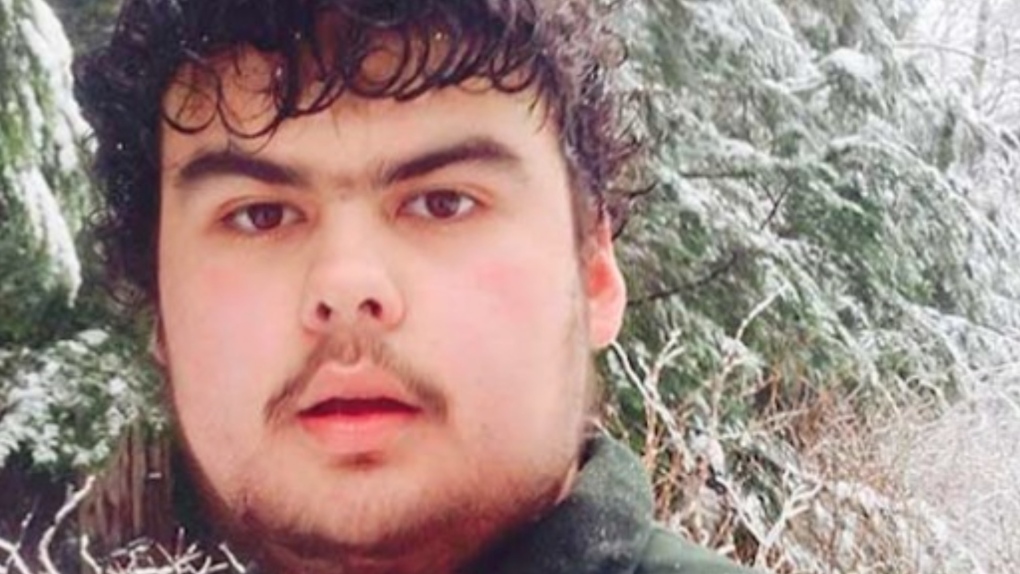B.C. piloted a $25M support hub for special needs children in a remote community. Parents say they're worse off than before
 The Family Connection Centre in Prince Rupert, B.C., was originally supposed to open in Spring 2023, but was delayed to December.
The Family Connection Centre in Prince Rupert, B.C., was originally supposed to open in Spring 2023, but was delayed to December.
When the B.C. government announced a new centralized service hub to provide an array of therapies for children with special needs in Prince Rupert and Haida Gwaii, Hannah Davis couldn’t help but feel skeptical.
She wondered how this untested service model – having a local non-profit take over a swath of treatments previously administered by Northern Health, the region's health authority – would thrive on the province's remote northwest coast.
But in March 2023, she decided to add her five-year-old son Miller, who is autistic and non-verbal, onto a waitlist for speech therapy and hope for the best.
One year later, the family has yet to receive a single appointment.
“I knew they would struggle to attract and retain people,” Davis told CTV News over the phone from Prince Rupert. “I work in HR, and we struggle to find qualified candidates – and it’s not medical professionals that we’re trying to recruit, it’s people in trades jobs and administrative work.”
 Hannah Davis said she's still waiting on speech therapy services for her five-year-old son, Miller.
Hannah Davis said she's still waiting on speech therapy services for her five-year-old son, Miller.
With the Family Connection Centre (FCC) pilot project, which launched in four communities last year, the provincial government promised a one-stop shop for everything from speech-language pathology to behaviour intervention, designed to get children off lengthy waitlists and into treatment, regardless of whether they have an official diagnosis.
The FCC in Prince Rupert currently has one local physiotherapist on staff, but no speech-language pathologists. A second phsyiotherapist and an occupational therapist are periodically flown in from the Lower Mainland.
Some local parents and practitioners have questioned why their small port city of about 12,000 people – which has a large Indigenous population, and was touched by a tragedy directly linked to a lack of special needs supports in the not-so-distant past – was chosen for the experiment.
“It’s scary to think there may be children and families that are impacted so negatively," Davis said. "It affects their future, which ultimately affects society as a whole.”
Garth Foote, a speech therapist who works for the Prince Rupert school district, shares those concerns, noting that early intervention is crucial for children who are non-verbal, and under ideal circumstances can begin before their first birthday.
"In the context of a struggling community, and certain families who are just hanging on, it could literally mean the difference between a child learning how to communicate verbally – you know, however imperfectly – and having to rely on a device to communicate," said Foote.
"And without a device, communication will take the form of behaviour problems."
What happened?
Prince Rupert's Family Connection Centre was contracted to North Coast Community Services (NCCS), with a commitment of $25 million in provincial funding over five years.
The non-profit – which previously provided child care and other family supports, but not things like speech or behaviour therapies – was the only bidder.
The restructuring that the NCCS required for the task, which meant moving to a larger space in need of significant renovations, was a massive undertaking. While B.C. promised the FCCs would be operational by spring 2023, Prince Rupert's official launch didn’t happen until December – months after Northern Health had stopped administering services.
While some therapies are now being offered at the FCC, some parents told CTV News the frequency of their children's appointments have decreased since NCCS took over.
One mother of a young child with a developmental disorder said she was recently told her son would finally be able to receive speech-language pathology through the Family Connection Centre – but only virtually, and not until April.
"That's really far away," said the woman, who asked to remain anonymous to avoid creating tension with her family's service providers. "That's been a major concern for my husband and I, because (our son) is just babbling."
"I don't want to completely bash the FCC," she added. "When we do get the services, it's amazing."
Some speech and occupational therapists who used to work for Northern Health have, for various personal reasons and operational concerns, declined to work with the FCC and either gone into private practice or left the community – leaving gaps in service that have historically been difficult to fill.
Sherry Beal, executive director of North Coast Community Services, declined an interview with CTV News, but in a written statement acknowledged that recruitment has been a struggle.
"Finding ways to overcome these unique challenges is one of the reasons these pilots are important, to learn what needs to be done," Beal wrote, adding that NCCS, which still provides child care and other services, is currently helping more than 60 children from dozens of families.
Asked about some of the concerns from parents – such as decreased frequency of appointments, and being stuck on waitlists – Beal said the FCC is "working to get families the services they need and move forward."
In a phone interview, Grace Lore, the province’s minister of children and family development, said the feedback she's heard from the community so far has left her “very concerned."
“I directed my staff to begin a contract management process with the North Coast Community Service Society,” Lore said last week. “There’s a formal process and it’s necessary to help us understand their capacity, and the extent to which they’re meeting our legal, contractual expectations.”
A dark history
For some in Prince Rupert, the need for comprehensive supports feels especially pressing in light of a dark incident that shook the community 10 years ago this April.
After years growing increasingly desperate for help, local mother Angie Elsie Robinson killed her teenage son Robert, who had severe autism, then took her own life.
 Angie Elsie Robinson killed her son Robert (pictured) then took her own life on April 3, 2014.
Angie Elsie Robinson killed her son Robert (pictured) then took her own life on April 3, 2014.
The 2014 murder-suicide prompted a coroner's inquest, which heard that Robinson received $6,000 per year from the province's Autism Funding Program – distributed to families with an official diagnosis – to pay for supports for her son.
She used the money to contract a one-to-one worker, though the inquest's findings noted the funding wasn't enough to maintain service "throughout the year," and that Robinson was consistently overwhelmed.
Her son was also deemed eligible for up to 14 days per month of respite services – time in care so parents can decompress – through the Ministry of Children and Family Development, but there were no such services available locally, meaning the mother would sometimes have to transport him 150 kilometres away, to Terrace, to take advantage of the program.
Respite placement was suspended in June 2013 due to safety concerns for staff, as the teenager had violent tendencies and would sometimes break windows or damage walls. The mother and son were dead less than a year later.
According to the inquest verdict, when police and a coroner searched the family's home after the murder-suicide, they found a note from Robinson expressing "hopelessness with her ability to care for her son … and the lack of options she had for his future," along with an apology.
Why Prince Rupert?
When the government's plan for centralized hubs was initially announced in October 2021, it was much further reaching, with the intention of opening FCCs in communities across the province in 2024.
But the proposal was met with swift backlash from parents, as it also meant phasing out the province's individualized autism funding for children under 19.
When David Eby became B.C.'s premier in 2022, he and Mitzi Dean, who was then the children's minister, quickly declared a pause: Individualized funding would remain, and the FCCs would move forward only as a pilot project in four communities, the others being Kelowna, Terrace-Kitimat and Bulkley Valley-Stikine.
Some in Prince Rupert and Haida Gwaii feel the communities have been used as guinea pigs – something that strikes them as even more outrageous given that most Haida Gwaii residents and roughly 40 per cent of Prince Rupert residents are Indigenous.
Presented with those concerns, Lore, who took over for Dean in January, told CTV News the province chose the locations based on need.
 Prince Rupert is located on B.C.'s northwest coast, near the Alaskan Panhandle.
Prince Rupert is located on B.C.'s northwest coast, near the Alaskan Panhandle.
"There have been gaps in services in northern and remote communities for far too long – kids not being able to access the services that they need – so our efforts here are about building out a system that works," Lore said. "I am, as minister, committed to taking the steps of what we learned from this, what needs to be done differently."
While the contract management process is underway, Lore said the government will be sending an outreach team, hosted by the North Vancouver school district and made up of speech therapists, an occupational therapist, a board-certified behaviour analyst and a part-time school psychologist to assist in Prince Rupert.
"Kids and families can't wait," the minister said.
Asked what checks and balances the government initially had in place for the FCC rollout, Lore reiterated that she was appointed minister less than two months ago, and had acted quickly to initiate contract management after hearing feedback from the community.
"These concerns were raised to me pretty early on, so we initiated this process," she said.
Snowflake in a frying pan
Davis’s five-year-old son has a professional autism diagnosis, which means even without the FCC, she receives $22,000 a year in funding for his various therapies. Since Northern Health stopped providing those services, she has been taking Miller to a private provider.
But when Miller turns six this summer, that annual funding will be reduced to $6,000 – the same as Angie Robinson received.
Davis and her family are in a much more fortunate financial position, and plan to continue paying for additional therapies out of pocket if necessary. She told CTV News she chose to speak out for the many others in the community who can't afford to do the same.
“I know there’s families where that’s not an option,” she said.
According to Foote, before Northern Health contracted services out to the FCC, there were four publicly funded speech-language pathologists employed in Prince Rupert.
Currently, he's the only one – and his time is split across four elementary schools, each of which he visits one day per week, plus a middle school and a high school. All told, Foote said he sees approximately 150 children.
Barring a rapid influx of services in Prince Rupert, Foote said he's worried for the fall, when he expects a new crop of children will arrive in the school system undiagnosed and unassessed – a common experience in his time serving what he describes as a high-need community with many historically-rooted challenges.
"There will be no report for me, I'll have to go in blind and cold and try to do a complex assessment. And I'm there one day a week, how much difference am I going to make?" he said.
"It's like a snowflake hitting a frying pan, that's what it is. That's exactly what it is."
Correction
A previous version of this article reported B.C. had sent a provincial outreach team to Prince Rupert to provide interim therapy services. As of March 19, the government has not sent a team, but is planning to send one.
CTVNews.ca Top Stories

Back on air: John Vennavally-Rao on reclaiming his career while living with cancer
'In February, there was a time when I thought my career as a TV reporter was over,' CTV News reporter and anchor John Vennavally-Rao writes.
The winter solstice is here, the Northern Hemisphere's darkest day
The winter solstice is Saturday, bringing the shortest day and longest night of the year to the Northern Hemisphere — ideal conditions for holiday lights and warm blankets.
Poilievre writes to GG calling for House recall, confidence vote after Singh declares he's ready to bring Liberals down
Conservative Leader Pierre Poilievre has written to Gov. Gen. Mary Simon, imploring her to 'use your authority to inform the prime minister that he must' recall the House of Commons so a non-confidence vote can be held. This move comes in light of NDP Leader Jagmeet Singh publishing a letter stating his caucus 'will vote to bring this government down' sometime in 2025.
School custodian stages surprise for Kitchener, Ont. students ahead of holiday break
He’s no Elf on the Shelf, but maybe closer to Ward of the Board.
Kelly Clarkson's subtle yet satisfying message to anyone single this Christmas
The singer and daytime-talk show host released a fireside video to accompany her 2021 holiday album, “When Christmas Comes Around” that she dubbed, “When Christmas Comes Around…Again.
Judge sentences Quebecer convicted of triple murder who shows 'no remorse'
A Quebecer convicted in a triple murder on Montreal's South Shore has been sentenced to life in prison without chance of parole for 20 years in the second-degree death of Synthia Bussieres.
At least 2 dead, 60 hurt after car drives into German Christmas market in suspected attack
A car plowed into a busy outdoor Christmas market in the eastern German city of Magdeburg on Friday, killing at least two people and injuring at least 60 others in what authorities suspect was an attack.
16-year-old German exchange student dies after North Vancouver crash
A 16-year-old high school student from Germany who was hit by a Jeep in North Vancouver, B.C., last weekend has died in hospital, authorities confirmed.
Poilievre to Trump: 'Canada will never be the 51st state'
Conservative leader Pierre Poilievre is responding to U.S. president-elect Donald Trump’s ongoing suggestions that Canada become the 51st state, saying it will 'never happen.'

































